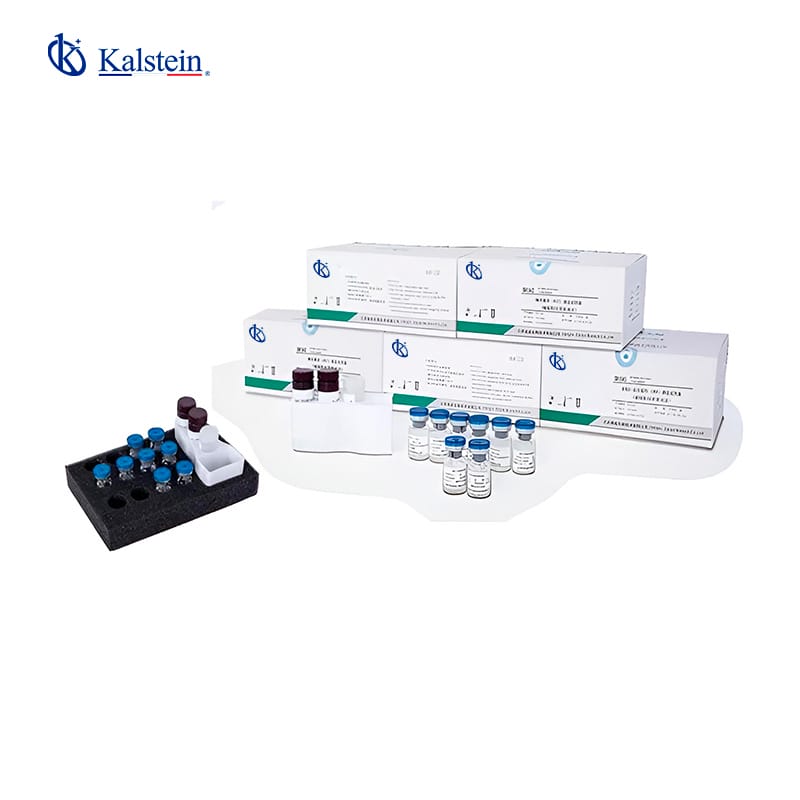Product Description
Kalstein’s Cardiac Marker Tests, models YRA363 to YRA367, represent a cutting-edge solution in cardiac biomarker testing. These tests leverage the principle of enzymatic chemiluminescence, utilizing alkaline phosphatase (AP) as the luminous marker, ensuring highly sensitive and accurate detection. Each test can be conducted from serum samples and is vital for diagnosing various cardiac conditions. The available models test for NT-ProBNP, D-Dimer, MYO, CK-MB, and hs-cTnI, covering a wide range of heart-related parameters.
These products come with multiple components that include magnetic beads, Anti-A/Anti-B identifiers, calibrators, and quality controls such as QC1 and QC2. This comprehensive set of components guarantees reliable and consistent results. The kits are available in varying sizes, offering options of 100, 50, and 48 tests per kit, providing flexibility to meet different laboratory needs. Furthermore, these kits are designed to be stored at a temperature range of 2-8°C to maintain the assay’s integrity over time.
| Model | YRA363 | YRA364 | YRA365 | YRA366 | YRA367 |
| Tested Parameter | NT-ProBNP | D-Dimer | MYO | CK-MB | hs-cTnI |
| Luminous Principle | Enzymatic chemiluminescence | ||||
| Luminous Marker | AP(alkaline phosphatase) | ||||
| Specification | 100 test/kit, 50 test/kit, 48 test/kit | ||||
| Principle | Competitive Method | ||||
| Components | Magnetic beads, Anti-A/Anti-B, Calibrators, QC1, QC2 | ||||
| Sample | Serum | ||||
| Storage | 2-8°C | ||||
Market Price
Cardiac marker tests generally have a varied price range in the market, influenced by the technology and specificity of the assay, the brand, and the number of tests contained within the kit. Prices for Kalstein’s Cardiac Marker Tests indicate a competitive range due to their high performance and advanced features. With standard market practices, a kit typically costs between $200 and $600, depending on the parameters assessed and the number of tests available in each kit. For the most accurate quote, potential buyers are encouraged to engage directly with our Kalstein Plus platform to tailor the product to their laboratory’s needs and receive a comprehensive cost analysis.
Frequently Asked Questions
What is the luminous principle used in Kalstein’s Cardiac Marker Tests?
The tests utilize an enzymatic chemiluminescence principle, which provides enhanced sensitivity and specificity in detecting cardiac biomarkers.
How should these kits be stored?
The kits should be stored at a temperature range of 2-8°C to preserve their integrity and ensure reliable results.
Are there different kit sizes available?
Yes, Kalstein offers these marker test kits in various sizes, including options with 100, 50, and 48 tests to accommodate different laboratory testing needs.
Advantages and Disadvantages
Advantages: Kalstein’s Cardiac Marker Tests are renowned for their high sensitivity and accuracy, made possible through advanced chemiluminescence technology. They are versatile, testing vital parameters involved in cardiac diagnostics such as NT-ProBNP and hs-cTnI, and come in multiple kit sizes to meet diverse requirements. The inclusion of quality control materials such as QC1 and QC2 ensures reliable and reproducible results.
Disadvantages: Despite the advanced technology, such kits might incur higher costs initially compared to simpler test methods. They also require careful handling and storage under specific conditions (2-8°C), which can add to operational overheads in settings without adequate storage facilities. However, these factors are outweighed by the precision and reliability offered, making them ideal for advanced diagnostic uses.
Product Use in the Field
Kalstein Cardiac Marker Tests are extensively used in clinical laboratories to provide rapid and accurate diagnostic information for cardiac health assessments. The tests are vital in emergency settings, monitoring cardiac conditions, and tracking treatment efficacy. The ability to test critical biomarkers such as D-Dimer and CK-MB quickly can be a significant advantage in high-pressure medical situations, allowing for timely clinical decisions and interventions.
Laboratory technicians should adhere to strict protocols for sample collection, handling, and assay setup to ensure data validity. The competitive methodology employed by these tests allows for differential diagnosis among various cardiac conditions, a crucial step in patient management.
Recommendations
For optimal use, it is advisable to adhere to the recommended storage instructions (2-8°C) to maintain reagent integrity. Regular calibration and participation in external quality assessments will enhance test accuracy. Laboratories should also ensure that staff are well-trained in handling and processing the assays, as incorrect techniques can lead to erroneous results. Investing in advanced training for personnel can mitigate this risk and elevate operational proficiency.
Regularly updating calibration and quality control procedures based on the current best practices will keep the testing process efficient and reliable. Engaging with the Kalstein team for technical support and updates can also provide ongoing benefits and insights into emerging best practices in the field.
If you are seeking a fusion of innovation and quality, you have arrived at the right place. At Kalstein, we offer you the luxury of exploring our exclusive catalog of laboratory equipment. We manufacture each piece of equipment with a level of excellence. Our intuitive and agile online shopping channels are designed for your convenience, ensuring the friendliest prices. Don’t hesitate any longer; we bring science to life, and it’s time for you to become part of our community. https://kalstein.net/en/product/cardiac-marker-test-yra363-yra367/.


